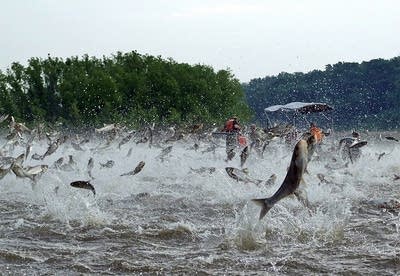17 state AGs favor watershed divide to fight Asian carp
Go Deeper.
Create an account or log in to save stories.
Like this?
Thanks for liking this story! We have added it to a list of your favorite stories.

Michigan Attorney General Bill Schuette said he and his counterparts in 16 other states would demand quicker federal action on preventing invasive species such as Asian carp from migrating between the Great Lakes and Mississippi River watersheds.
Schuette told The Associated Press that a coalition of state attorneys general reaching from West Virginia to Nevada would push Congress and the U.S. Army Corps of Engineers to expedite a plan for severing the connection between the two giant drainage basins that engineers constructed a century ago in Chicago rivers and canals.
Supporters contend it's the only way to slam the door on species invasions that have disrupted aquatic ecosystems and cost billions in damages in both basins. Local cargo shippers and their allies say such a move would cause massive flooding and job losses in the Chicago area.
The Army Corps has promised to conclude by 2015 a long-range study of methods for cutting off potential avenues for species to transfer between the two basins, including separating them by installing dams or other structures.
Turn Up Your Support
MPR News helps you turn down the noise and build shared understanding. Turn up your support for this public resource and keep trusted journalism accessible to all.
But carrying out whatever the agency recommends could take many more years, and money will be tight. Environmental activists, state and local officials, Indian tribes and others across most of the Great Lakes region are pleading with the Corps to move faster.
Five states -- Michigan, Minnesota, Ohio, Pennsylvania and Wisconsin -- are pressing a federal lawsuit that accuses the Army Corps and Chicago's municipal water agency of operating a public nuisance and demands the quickest possible action to physically separate the Great Lakes and Mississippi systems.

The attorneys general from those states and New York said in August they would try to assemble a nationwide coalition in favor of separation.
Illinois and Indiana, the other two states adjoining the Great Lakes, haven't joined the lawsuits. Indiana officials say blocking the waterways could cause economic problems for their communities near Chicago.
Schuette said the idea of separation has now drawn endorsements from attorneys general in Arizona, Arkansas, Colorado, Iowa, Kansas, Louisiana, Missouri, South Dakota, Utah, West Virginia and Wyoming.
It's unclear what practical effect the attorneys generals' campaign could have, with the lawsuit by the five states already pending. The U.S. Supreme Court and lower courts have refused to order the Army Corps to expedite its study or take temporary measures such as closing Chicago-area shipping locks that could provide a pathway to Lake Michigan for Asian carp.
Still, as political leaders and chief legal strategists for their state governments, the attorneys general could wield considerable influence, said Joel Brammeier, president of the Alliance for the Great Lakes, an environmental advocacy group.
"They're guardians of their states' resources and they're helping to monitor threats from other places," Brammeier said. "They're well within their bounds to be pushing for a faster timeline on this, because they know what's at stake."
"This national coalition will make our message loud and clear: It is time to shut down the invasive species highway."
Many of the states that are new members of the coalition have suffered ill effects of invasions by species such as zebra and quagga mussels, which hitched rides from central Europe to the Great Lakes in the ballast tanks of oceangoing freight ships.
After colonizing the Great Lakes, they moved into the Mississippi basin and have infested waterways as far south as the Arkansas River and west to Lake Mead, which supplies water for drinking and irrigation to much of southern Nevada, southern California and Arizona.
"With jobs at stake and the ecology of our waters at risk, this national coalition will make our message loud and clear: It is time to shut down the invasive species highway," Schuette said. "I am honored to be joined by attorneys general from across our country asking for immediate action to combat a looming crisis in our waters."
The Army Corps declined to comment on Schuette's announcement. Corps officials have said repeatedly their schedule was reasonable given the complex scientific and engineering issues involved. Maj. Gen. John Peabody, who until recently was commander of the Corps' Great Lakes and Ohio River Division, said last month he welcomed the involvement of state officials in developing the study.
"I do not believe the Corps is dragging their feet," said Kay Nelson, a spokeswoman for UnLock Our Jobs, a coalition representing Chicago-area businesses including barge and tour boat operators. "It's an extensive job they've been given."
The Corps operates an electric barrier on a shipping canal south of Chicago that is designed to prevent fish from swimming between the two drainage basins. The agency says it is working well, but some fear otherwise because scientists have detected Asian carp DNA in water samples beyond the barrier.
Much of the recent debate over species invasions through the Chicago-area waterways has focused on the threat that bighead and silver carp, both Asian species migrating northward in the Mississippi and its tributaries, pose to the Great Lakes and their $7 billion fishing industry. But many states are worrying about being on the receiving end of invasions from the Great Lakes, Brammeier said.
"The most passionate testimony that I heard in two congressional hearings about Asian carp back in 2010 came from a fish and wildlife state director from Kansas, not the Great Lakes," Brammeier said. "He understood the impact that zebra mussels and other invasives had had on his state's resources."
(Copyright 2011 by The Associated Press. All Rights Reserved.)




